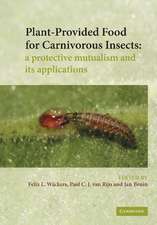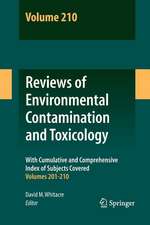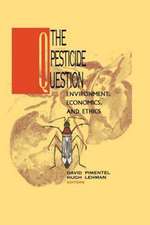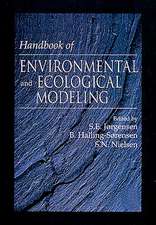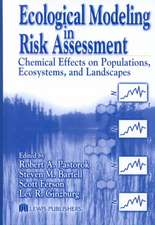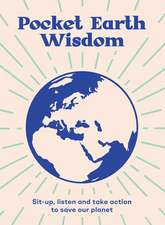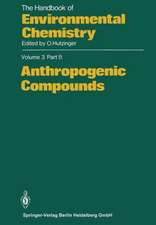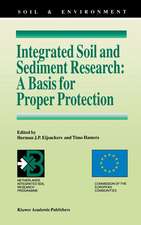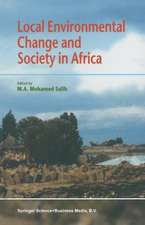Recent Advances and Issues in Environmental Science
Editat de III Hunteren Limba Engleză Hardback – 15 dec 2011
Environmental science integrates physical and biological sciences to the study of the environment, with the goal of solving today’s environmental challenges. Many of these challenges tie into a greater concept of using the earth’s resources sustainably. This collection brings together some very important advances in environmental science, including how climate change affects plant disease, how to keep birds and bats away from wind turbines, disinfecting polluted water for drinking, how climate policy impacts natural habitats, cancer risk due to ecological issues, and much more.
| Toate formatele și edițiile | Preț | Express |
|---|---|---|
| Paperback (1) | 579.62 lei 6-8 săpt. | |
| Apple Academic Press Inc. – 31 mar 2021 | 579.62 lei 6-8 săpt. | |
| Hardback (1) | 976.21 lei 6-8 săpt. | |
| Apple Academic Press Inc. – 15 dec 2011 | 976.21 lei 6-8 săpt. |
Preț: 976.21 lei
Preț vechi: 1190.49 lei
-18% Nou
Puncte Express: 1464
Preț estimativ în valută:
186.85€ • 194.33$ • 156.58£
186.85€ • 194.33$ • 156.58£
Carte tipărită la comandă
Livrare economică 13-27 martie
Preluare comenzi: 021 569.72.76
Specificații
ISBN-13: 9781926692708
ISBN-10: 1926692705
Pagini: 272
Dimensiuni: 156 x 234 x 28 mm
Greutate: 0.54 kg
Ediția:1
Editura: Apple Academic Press Inc.
Colecția Apple Academic Press
ISBN-10: 1926692705
Pagini: 272
Dimensiuni: 156 x 234 x 28 mm
Greutate: 0.54 kg
Ediția:1
Editura: Apple Academic Press Inc.
Colecția Apple Academic Press
Public țintă
Academic and PostgraduateCuprins
Spatial Analysis of Plague in California: Niche Modeling Predictions of the Current Distribution and Potential Response to Climate Change. Exploring the Molecular Basis of Insecticide Resistance in the Dengue Vector Aedes aegypti: A Case Study in Martinique Island (French West Indies). The Aversive Effect of Electromagnetic Radiation on Foraging Bats—A Possible Means of Discouraging Bats from Approaching Wind Turbines. Solar Drinking Water Disinfection (SODIS) to Reduce Childhood Diarrhea in Rural Bolivia: A Cluster-Randomized, Controlled Trial. Energy Sprawl or Energy Efficiency: Climate Policy Impacts on Natural Habitat for the United States of America. Impact Monitoring of the National Scale Up of Zinc Treatment for Childhood Diarrhea in Bangladesh: Repeat Ecologic Surveys. Ecological Equivalence: A Realistic Assumption for Niche Theory as a Testable Alternative to Neutral Theory. Phylogeographic Analysis Reveals Association of Tick-Borne Pathogen, Anaplasma marginale, MSP1a Sequences with Ecological Traits Affecting Tick Vector Performance. Cancer Risk Among Residents of Rhineland-Palatinate Winegrowing Communities: A Cancer-Registry Based Ecological Study. Climate Change, Habitat Loss, Protected Areas and the Climate Adaptation Potential of Species in Mediterranean Ecosystems Worldwide. Risk of Congenital Anomalies Around a Municipal Solid Waste Incinerator: A GIS-Based Case-Control Study. Australia’s Dengue Risk Driven by Human Adaptation to Climate Change. Oil and Gas Projects in the Western Amazon: Threats to Wilderness, Biodiversity, and Indigenous Peoples. Malaria and Water Resource Development: The Case of Gilgel-Gibe Hydroelectric Dam in Ethiopia. Effective Environmental Management Through Environmental Knowledge Management. Index.
Notă biografică
Professor William Hunter III has been fishing and studying fish since he was a very small child, as he grew up on a small lake, enjoying what the lake had to offer year round. He transformed his love of fishing into the academic study of marine ecology, with a master’s degree from the State University of New York at Buffalo with a specific focus in ecology and evolution. He has done extensive research in the fields of limnology and the effect of water quality on aquatic life. His work is currently funded by the U.S. National Science Foundation, where he oversees research into the effects of a municipal sewer project on the water chemistry and aquatic life of the New York state lake where he lived during his childhood.
Descriere
This title includes a number of Open Access chapters.
Environmental science integrates physical and biological sciences to the study of the environment, with the goal of solving today’s environmental challenges. Many of these challenges tie into a greater concept of using the earth’s resources sustainably. This collection brings together some very important advances in environmental science, including how climate change affects plant disease, how to keep birds and bats away from wind turbines, disinfecting polluted water for drinking, how climate policy impacts natural habitats, cancer risk due to ecological issues, and much more.
Environmental science integrates physical and biological sciences to the study of the environment, with the goal of solving today’s environmental challenges. Many of these challenges tie into a greater concept of using the earth’s resources sustainably. This collection brings together some very important advances in environmental science, including how climate change affects plant disease, how to keep birds and bats away from wind turbines, disinfecting polluted water for drinking, how climate policy impacts natural habitats, cancer risk due to ecological issues, and much more.

